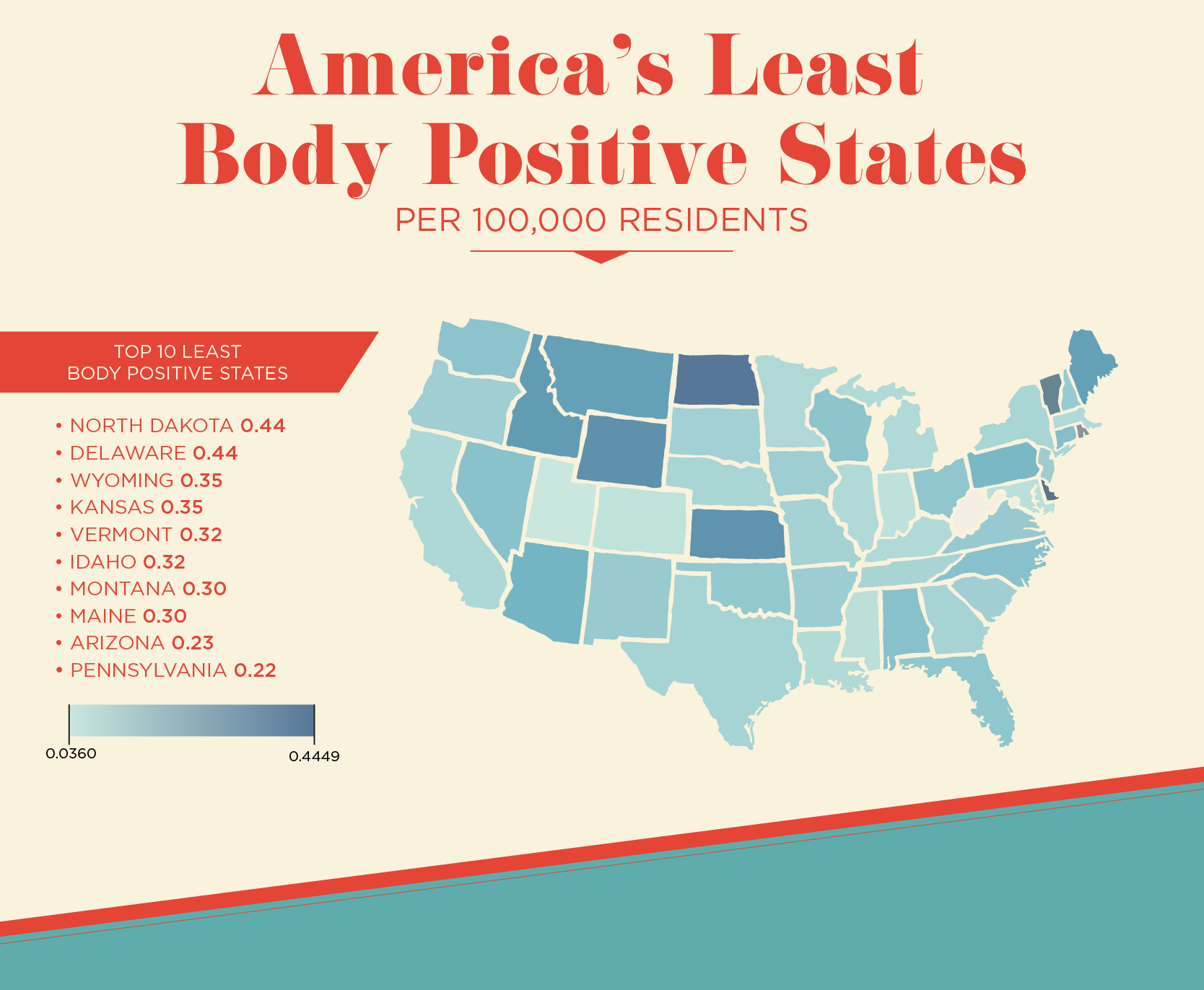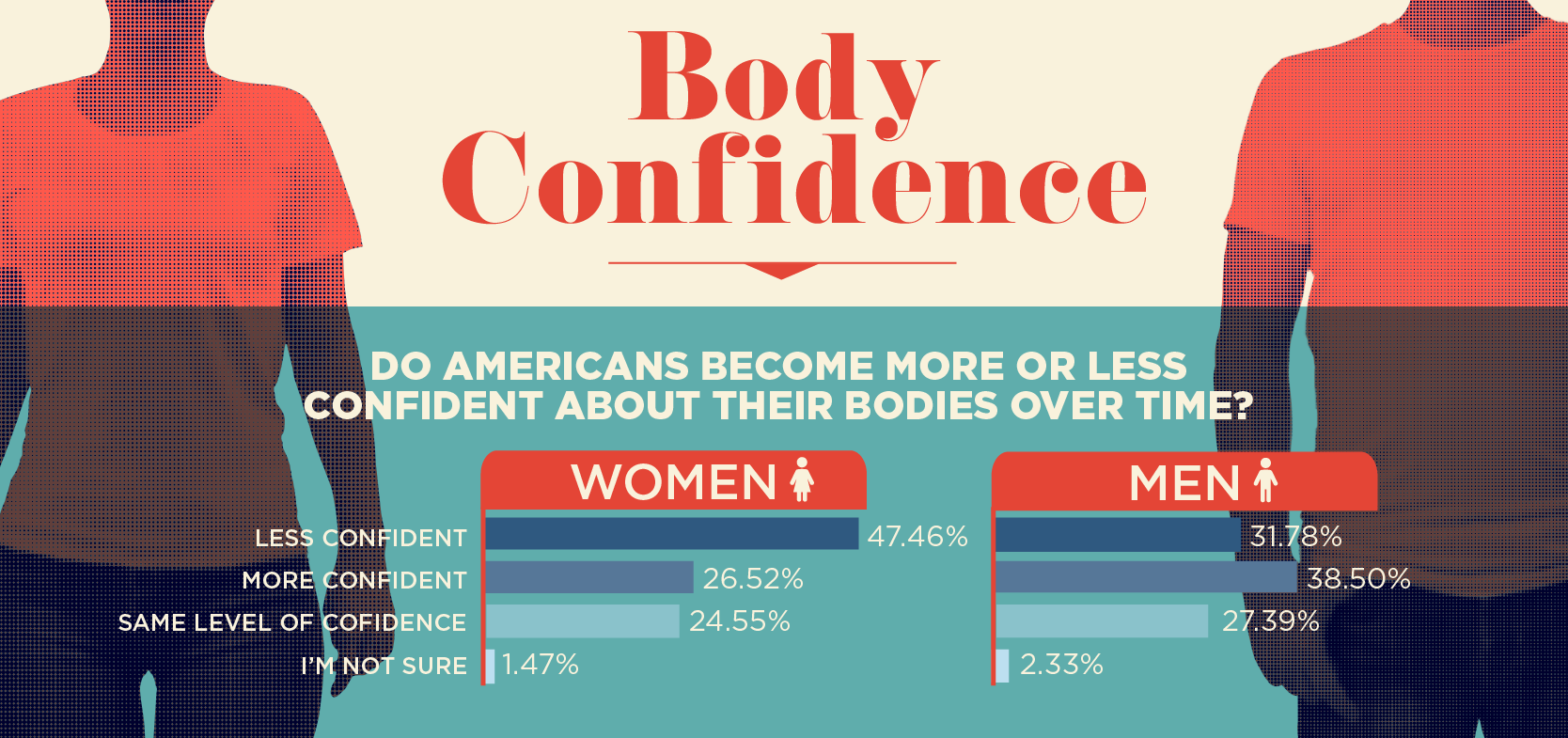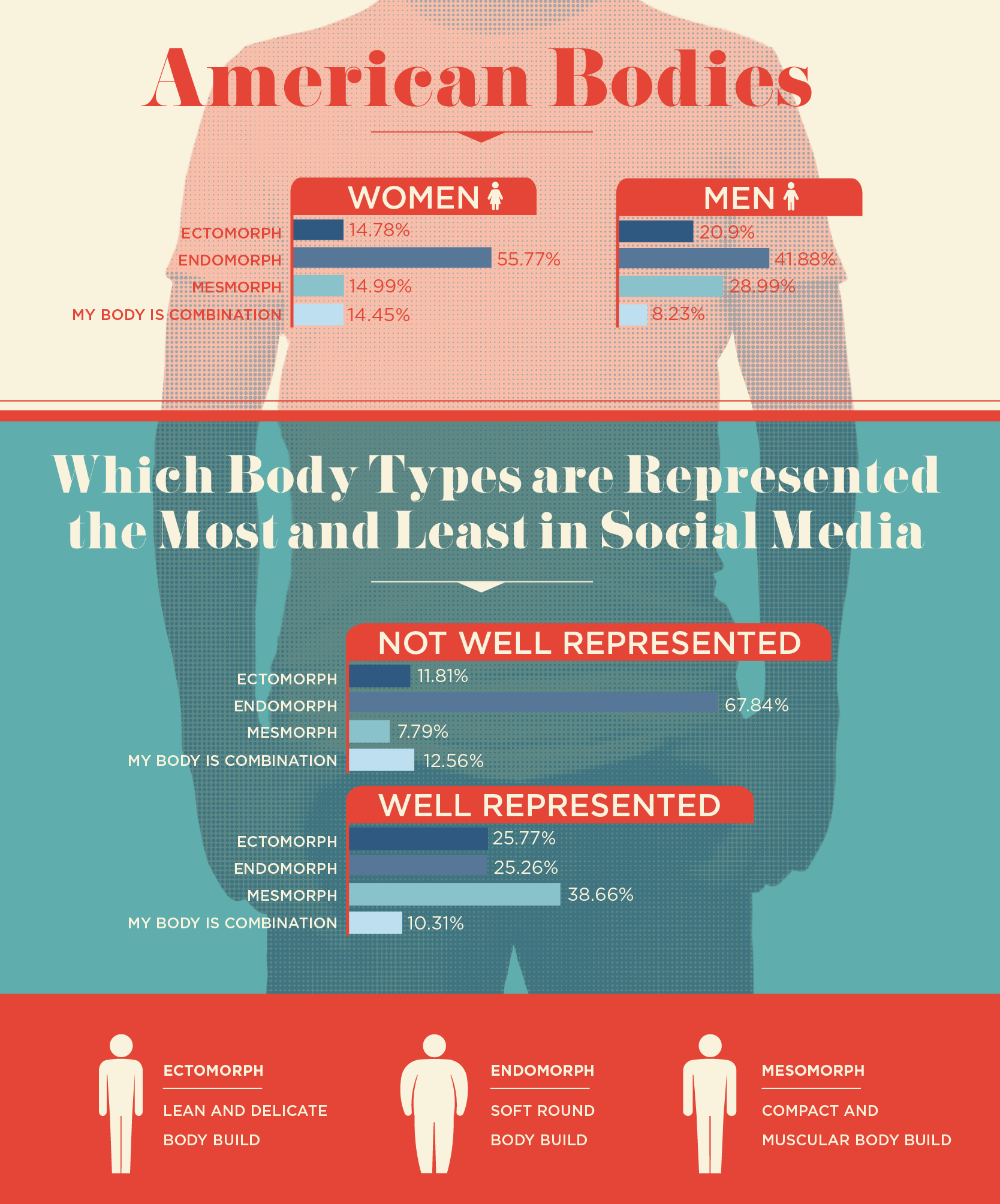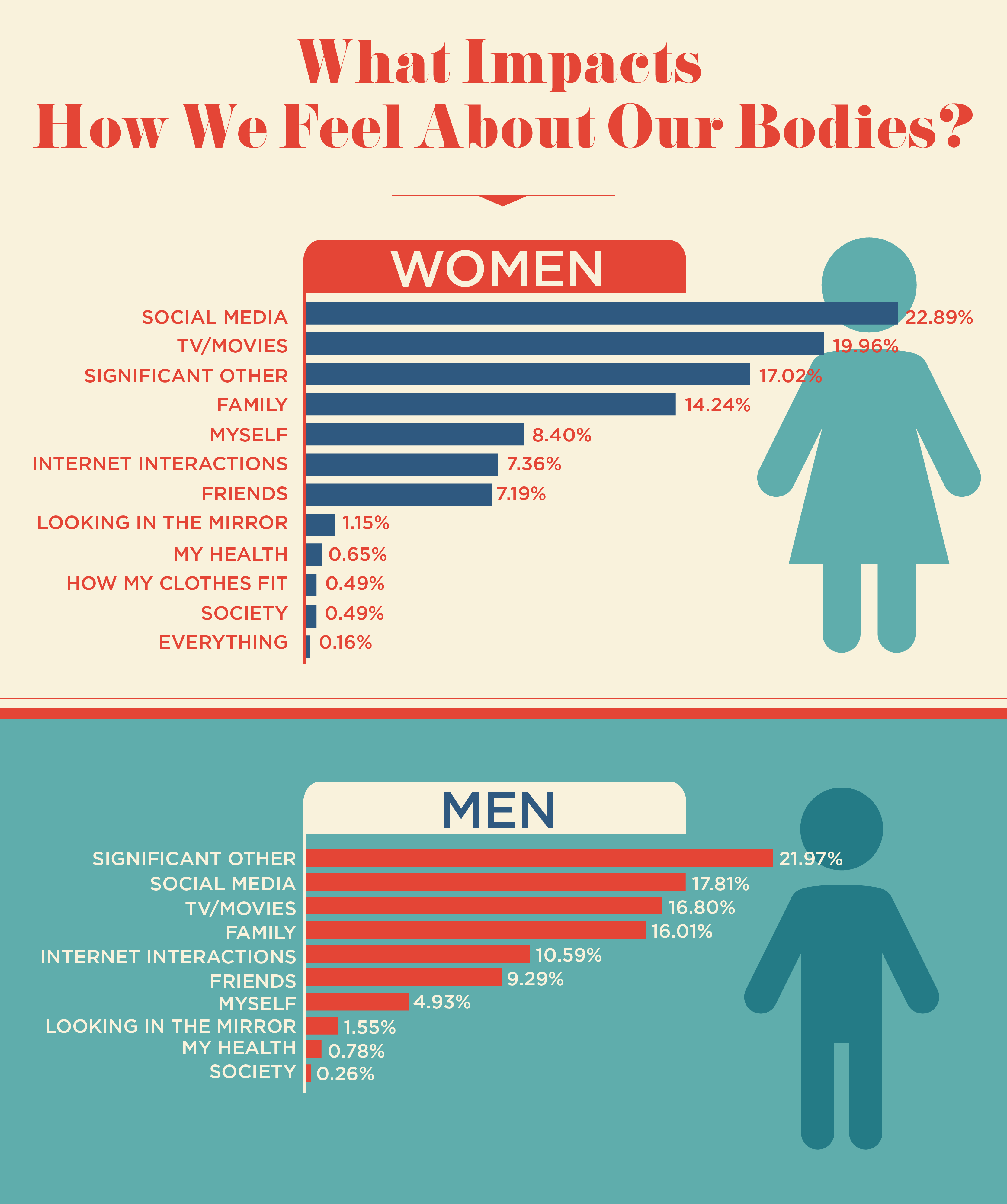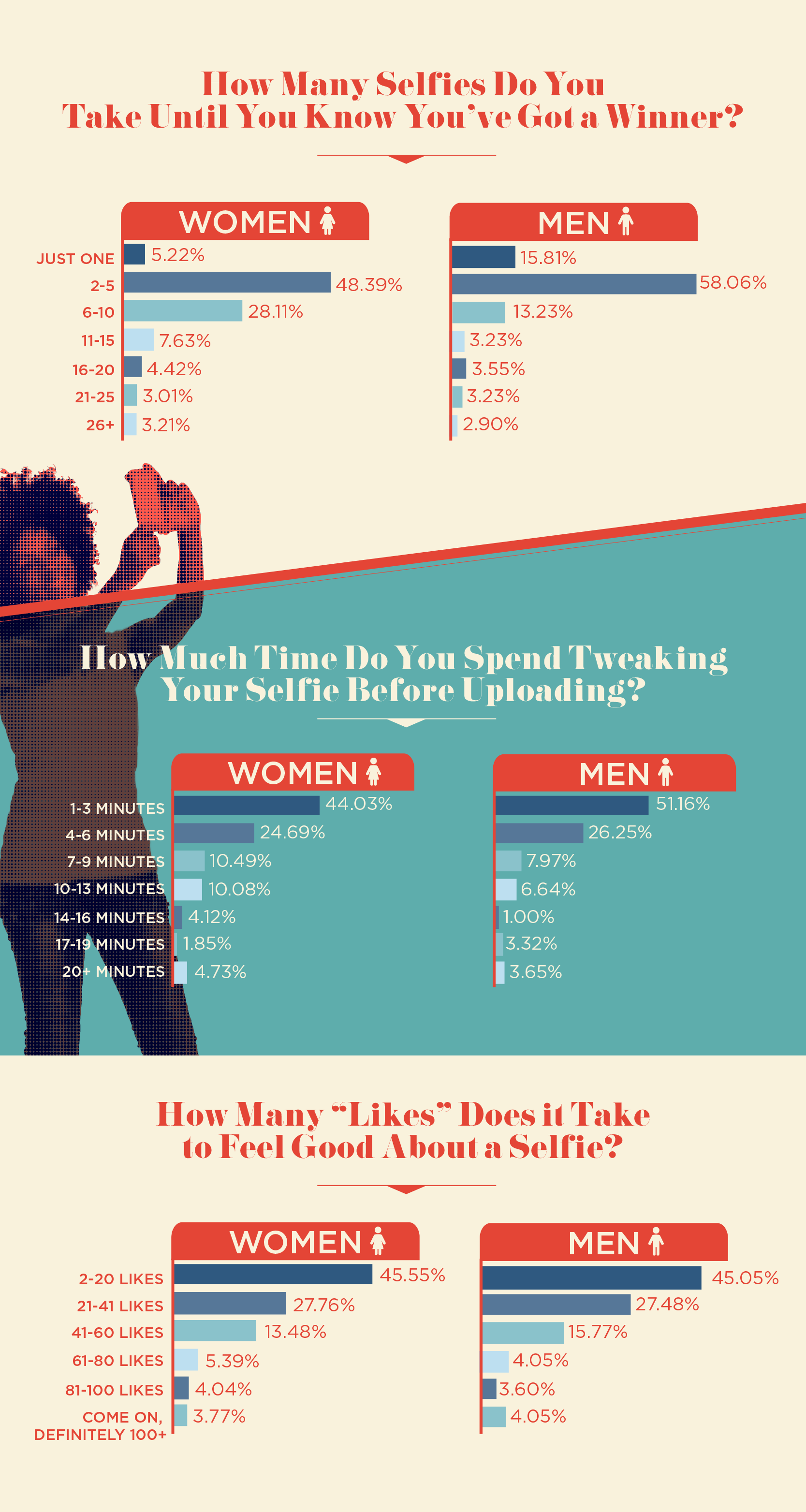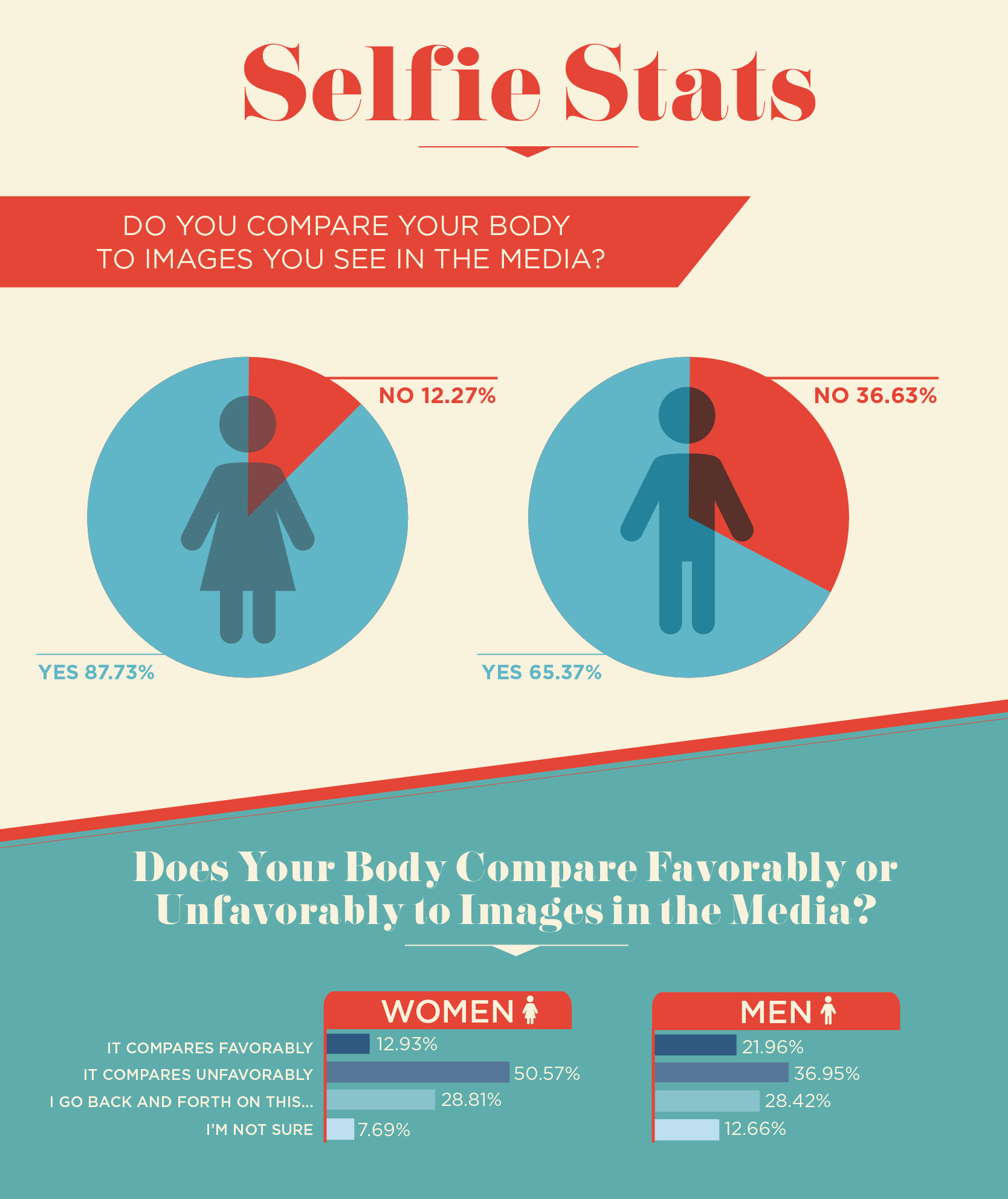
Americans have long had complicated relationships with their body image. But in recent years, the rise of social media has added another layer of complexity. Bombarded with images of toned arms, legs, and rock-hard abs in their newsfeeds, many people struggle with eating disorders, body dysmorphia, and their own body confidence.
Body Image and Social Media Questionnaire
To gain a better understanding of how people feel about their bodies, we surveyed 1,000 men and women on a variety of topics, from body positivity to confidence, mainstream media to selfies. Which states’ residents struggle with body positivity? Which factors shape the way people feel about their bodies? And how many “likes” are enough to make people feel good about that selfie they posted? Read on for the truth about body image and social media.
Body Image Across the U.S.
When it comes to cultivating a strong positive body image, people in some states seem to have an easier time than people in others. North Dakota, Delaware, and Wyoming top the list for states with the lowest level of body positivity. Factors such as population and culture may come into play—for instance, just as various states may be more likely to embrace health and fitness, some states are more apt to accept bodies of all shapes and sizes. Clearly, not all states have the same culture of acceptance nor opportunities as a state like Oregon does, which is home to body-positive personal trainers, gyms, and waxing salons.
Aging and Body Positivity
There’s no denying that our bodies change as we age: a little extra weight, wrinkles, age spots, and gray hair are some examples. Some people struggle with their body confidence as they grow older; others embrace the changes and feel the same—or even better—about themselves as the years pass.
According to our survey, men are more likely than women to be in the second camp. Among our respondents, nearly 4 in 10 men report they feel more confident as they age, while fewer than 27 percent of women say the same. On the other hand, nearly half of women say their confidence wanes as they age, while only around 32 percent of men experience plummeting self-esteem. Roughly one-quarter of respondents of each sex say their confidence level has stayed the same over time.
Body Types and Media Representation
In the fitness world, bodies are generally broken down into three categories:
- The ectomorph is generally thin with a fast metabolism, and may even have trouble gaining weight.
- The endomorph generally has a larger frame with more fat, has difficulty losing weight, and may struggle with fatigue and a large appetite.
- The mesomorph usually has wide shoulders and a small waist, and is able to eat moderately and gain muscle fairly easily.
Among our respondents, 56 percent of women identified as larger-bodied endomorphs, compared with 42 percent of men. Men are more likely to characterize themselves as slim: Around 21 percent of men say they are ectomorphs, compared with 15 percent of women. And a surprising 29 percent of men think they’re muscular mesomorphs compared with just 15 percent of women.
Which body types do people see most on their social media feeds? Nearly 7 in 10 say endomorphs are in short supply in the Facebook and Instagram photos they see. According to respondents, mesomorphs are the body type that gets the most play on social media, either way, this may result in individuals that would benefit from eating disorder recovery.
Factors that Shape Body Image for Men and Women
When it comes to how people feel about their bodies, a number of factors come into play. These are fairly different between men and women. Interestingly, neither gender ranks looking in the mirror, the way their clothes fit, or their health particularly high on the scale of importance, however these factors may impact those with an eating disorder or who are in eating disorder recovery.
Instead, for women, social media is the top factor, followed by mainstream media (television and movies). The perceptions of other people are the next-most important: first, their significant other; second, their family member; and lastly, themselves.
However, for men, their significant other is the top factor in how they feel about their body, above both social media and mainstream media. In addition, interactions with strangers rank higher than the impact they have on themselves.
Social Media Selfies and Body Confidence
Everyone’s done it: Put on that well-practiced expression, click a few times from different angles, make a few tweaks, and then upload the most flattering photo to social media for friends and family to admire.
How many shots do people take? For around 58 percent of men and 48 percent of women, it takes 2 to 5 snaps to get a social-worthy selfie. But some need more: Around 28 percent of women need 6 to 10 shots, compared with only 13 percent of men. What about the one-shot wonders? Around 16 percent of men take a single selfie before they post, compared with 5 percent of women.
When it comes to editing the selfie, around half of men and 44 percent of women only take 1 to 3 minutes to make the desired tweaks. Around one-quarter of both genders take a little longer (4 to 6 minutes). Around 21 percent of women take 10 minutes or longer, compared with nearly 15 percent of men.
Surprisingly, when it comes to feeling validated on social media, men and women are quite similar: Just under half of both genders say they only need 2 to 20 “likes” to feel good about a selfie, and 28 percent of both genders report 21 to 41 likes is sufficient.
Body Positivity and Media Comparisons
When people watch movies and TV, many viewers compare their own bodies to those of the stars onscreen. Our survey found 88 percent of women make these comparisons, compared with 65 percent of men. A whopping 51 percent of women say their body compares unfavorably with media images, while only 37 percent of men say the same. According to experts, many men do face serious struggles related to body image. However, our survey reveals that when it comes to the body image gender divide, men still come out on top in terms of confidence.
Embracing Your Body Image
As our survey reveals, many people across the country grapple with poor body image. Whether they’re scrolling through news feeds, feeling awkward, or struggling to choose the best selfie to post – many men and women find it difficult to remain body positive and may eventually suffer from an eating disorder and need eating disorder rehab.
While achieving body positivity can be a lifelong process, you can get started on your journey today. Be kind to yourself, and don’t criticize your body. Reframe your flaws as assets. Ditch the scale, and focus on eating food that makes you feel good and having fun while you exercise. Wear clothes you love. Surround yourself with positive people. Accept your body, laugh loudly, and take up as much space as you need.
If you or someone you love is facing serious body image issues, it’s time to get the help you deserve, and FHE Health, a South Florida eating disorder recovery and premier mental health and addiction treatment facility, is here to help. Our goal is to help our patients attain a state of mental health in which their overall well-being is a priority. To accomplish this, each patient undergoes a comprehensive psychiatric evaluation to determine a correct and accurate diagnosis, allowing us to tailor a specific and individualized treatment to support your recovery journey. If you’re suffering from body image issues or an eating disorder and are looking for a South Florida drug rehab center, consider in-house rehabilitation at FHE Health.
Methodology
We surveyed 1,024 people. Our respondents chose to participate in the survey and this survey was open for all demographics to take. Our respondents are exclusively from the United States. We utilized Amazon’s Mechanical Turk service to find respondents.
More of our Studies
Millennial Drinking Trends – A Look at Millennial Drinking Culture
Thoughts on Drug Addiction – Surveying Attitudes Toward Different Drugs From Users vs. Non-users

Extra Life – Video Game Addiction Statistics
Sources
- https://www.pdxmonthly.com/articles/2016/7/12/is-oregon-the-most-body-positive-state-in-america
- https://time.com/4622653/men-body-image-muscle-steroids
Fair Use
Want to use our study? Please feel free! All that we ask is that you include a link back to this page so readers can learn more about the study.
